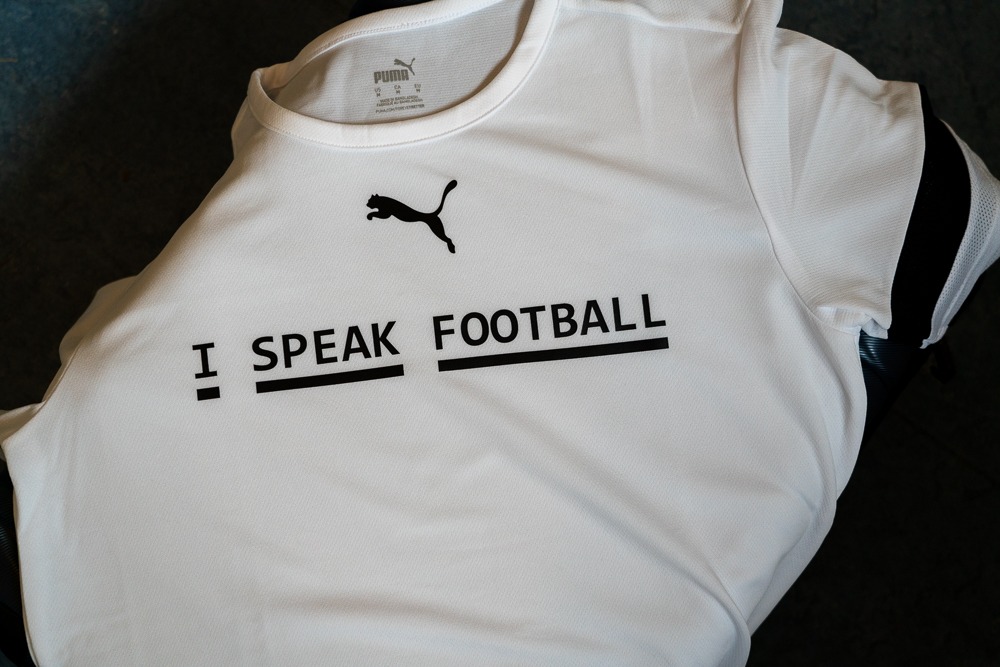Across Europe’s shores, a harrowing reality unfolds daily as countless migrants undertake perilous journeys in search of safety and opportunity. Fleeing war, persecution, and economic despair, they risk everything. For many the arrival in a new country is only the beginning of another battle—facing hostility, bureaucratic hurdles, and a desperate fight for belonging. In this era of unprecedented displacement, the plight of migrants calls for urgent action, empathy, and inclusive solutions that honor the courage it takes to seek a better life.
In this world where borders often divide and cultures can feel worlds apart, football is uniting. Few initiatives capture this better than I Speak Football, a program that uses the universal appeal of the beautiful game to bridge gaps between migrants and their new communities. Born from the belief that football transcends language, nationality, and background, I Speak Football is a lifeline for migrants navigating the challenges of displacement, offering them not just a place to play but a platform to belong. They show that football truly is a universal language.
As we mark International Migrants Day, I Speak Football stands as a testament to football’s unique ability to create connections and foster inclusion. Through its grassroots approach, the program empowers young migrants to build friendships, develop skills, and integrate into society—all through the simple, yet profound act of playing the game. It’s more than football; it’s a movement of hope, acceptance, and community.
Djibril Ayofe, founded I Speak Football five years ago, inspired by his personal struggles learning English as a migrant from The Ivory Coast. Traditional classroom methods were tough for the Ivorian turned UK resident, but he discovered that communication on the football pitch came naturally. Combining language learning with the sport he loves, Djibril created a project that makes learning accessible, fun, and engaging for migrants facing similar challenges. Driven by his own journey, he is now determined to ensure others have a smoother path toward integration, language skills, and a sense of belonging. Djibril was nice enough to share both his story and his vision for the future of his project with the Bonito Platform.
 Bonito: Djibril, thank you so much for joining us on this International Migrants Day to speak about your wonderful program. Can you share your personal journey and how did your passion for football inspire you to create the I Speak Football program?
Bonito: Djibril, thank you so much for joining us on this International Migrants Day to speak about your wonderful program. Can you share your personal journey and how did your passion for football inspire you to create the I Speak Football program?
Djibril: I moved to the UK 9 years ago from the Ivory Coast. Thats a big change in culture and language. I was 17 years old, loved playing football, but speaking English as a second language made it challenging to take part in football activities with the other kids. Together with some friends we set up I Speak Football™ to support other young migrants and refugees to improve their English through football sessions that incorporate English language classes.
Bontio: Often migrants who come to a new contry face so many difficulties including communicating in a new language- thats where football can step in- what is it about football that seems to make it such a universal language no matter where you come from?
Djibril: For me, the game is the centre of anything we do, it’s exciting and always changing. It’s different in each country yet the same. I think that makes it like language. I know that wherever I have been I can go to a place and understand it. I also know that when I want to play well, I need to be able to communicate, and communicate quickly. This forces me to learn things that can help me succeed. I love the feeling of being part of a team and having a common goal, I want everyone that joins I Speak Football to feel that in their hearts. That we belong.
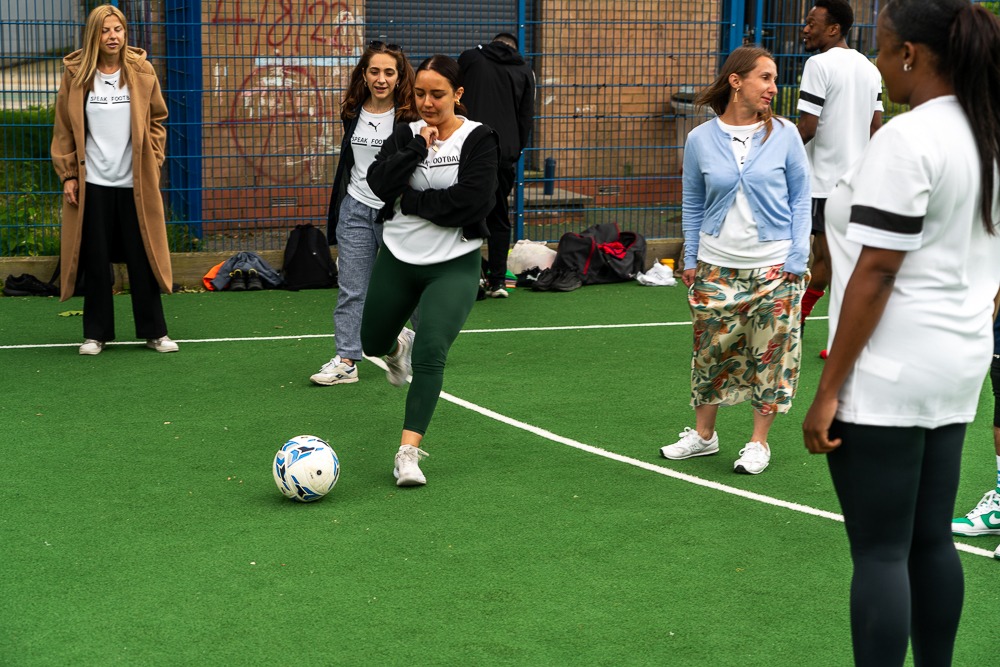 Bonito: How important is it for newcomers to have a safe and productive environment to learn the local language of their new country?
Bonito: How important is it for newcomers to have a safe and productive environment to learn the local language of their new country?
Djibril: Its very important but not just about the language- As migrants, it can feel like we have left the harder times behind, but unfortunately for many of us it still is quite difficult in our new countries. We are happy for the opportunity to learn the language and contribute to our new communities but we still carry baggage- the scars left behind from our journey. Working with experts in trauma-informed approaches has taught me a lot about how to approach sensitive issues, and also when to approach them. It has to be led by the individual and at their own pace. Many of the people that play don’t want to talk about their trauma, and that’s OK, but some do want to discuss it. We aren’t social workers or psychologists but we make sure we listen so that I Speak Football is a positive experience.
Bonito: Can you tell us about the I Speak Football program in more detail and how it addresses the many barriers that new arrivals to countries often face in their efforts to integrate?
Djibril: Although the core of the program is language, mental health and football, we have quickly seen that our beneficiaries also need support in study readiness and employability skills. That’s why we’ve adapted some methodologies to have employability sessions as well as language sessions, and have added CV and interview workshops either as online sessions or in person to help them thrive in the community. With “the ball as the hook” we can do so much for these young people and help them integrate in their new communities.
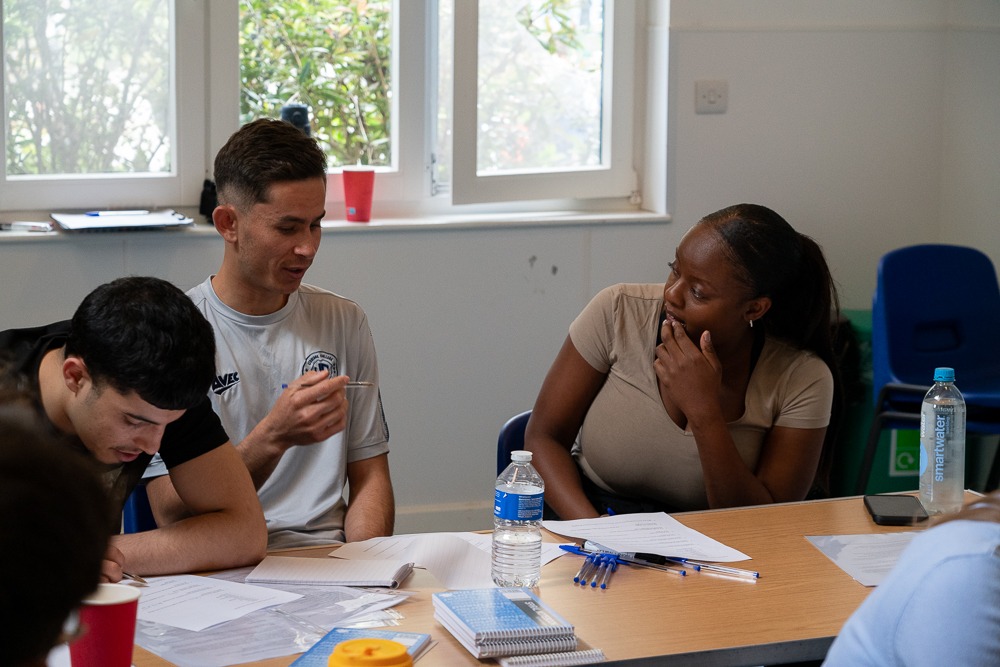 Bonito: The journey that many immigrants face in moving to their new countries often presents a tremendous strain on mental health- how does football help to improve that and to build further resilience going forward?
Bonito: The journey that many immigrants face in moving to their new countries often presents a tremendous strain on mental health- how does football help to improve that and to build further resilience going forward?
Djibril: I don’t know about other migrants, but for me it was an escape, somewhere I could go to feel comfortable and confident. It didn’t cost me much money, and no-one bothered me on the football pitch. Especially at first, it was the only place I felt OK. As I stayed longer here, it also gave me a sense of identity, Djibril the football player, Djibril the captain, and now Djibril from I Speak Football. I hope it provides other people that safe space, and a set of peers to learn and rely on- just like it has for me. We all need a safe lace to be authentic and feel we belong.
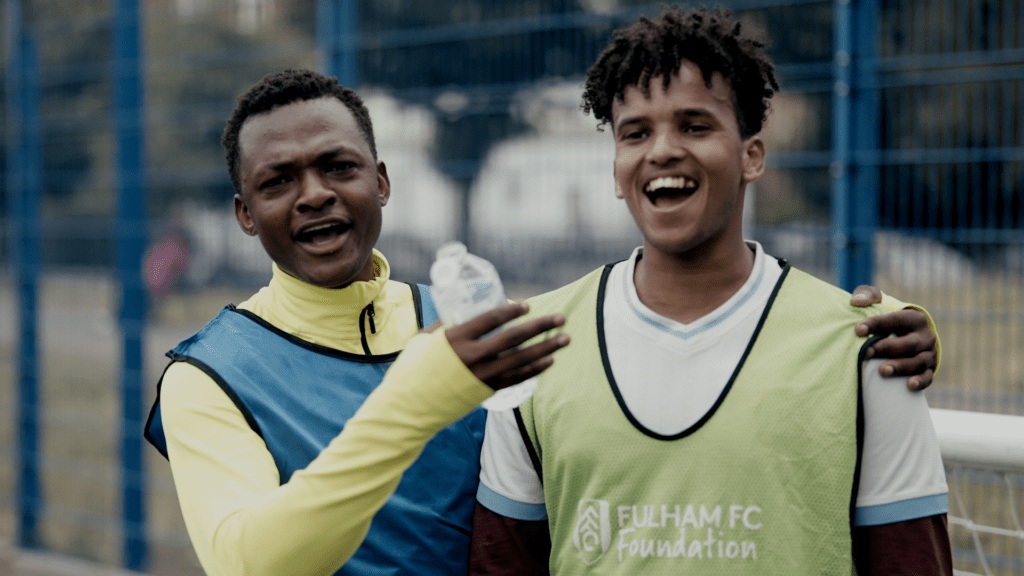 Bonito: Reflecting on your journey in football, is there a particular moment or experience that profoundly touched you and reinforced your commitment to this work?
Bonito: Reflecting on your journey in football, is there a particular moment or experience that profoundly touched you and reinforced your commitment to this work?
Djibril: Getting the coaching from the Chelsea FC, and Fulham FC coaches was amazing! Just knowing those people got to work with other Africans and amazing footballers was really inspiring. Many people come to the UK to play football and to have that support and see that badge was amazing for me. Watching new migrants come, and be shy, then grow more confident is really amazing for me- especially as I used to be very shy!
Bonito: Where do you see this project developing over the next years? what are the plans for the future and for expanding?
Djibril: We are really excited for 2025, with new partners including GOALs, Loughborough University and others. We have fundraising targets for sessions in Chingford, Wembley and Camden. As well as expanding to areas where we can use I Speak Football as a tool to bring communities together. We think the riots this year showed that communities have a lot of problems, and football should be used as a tool to bring them together. So we want to add areas outside London, and especially those places dealing with lots of migration. We also have applied for funding to develop I Speak Football in Europe and America, and even a pilot with a wonderful basketball coach to start I Speak Basketball in Easter 2025. We have big plans, but are still learning.
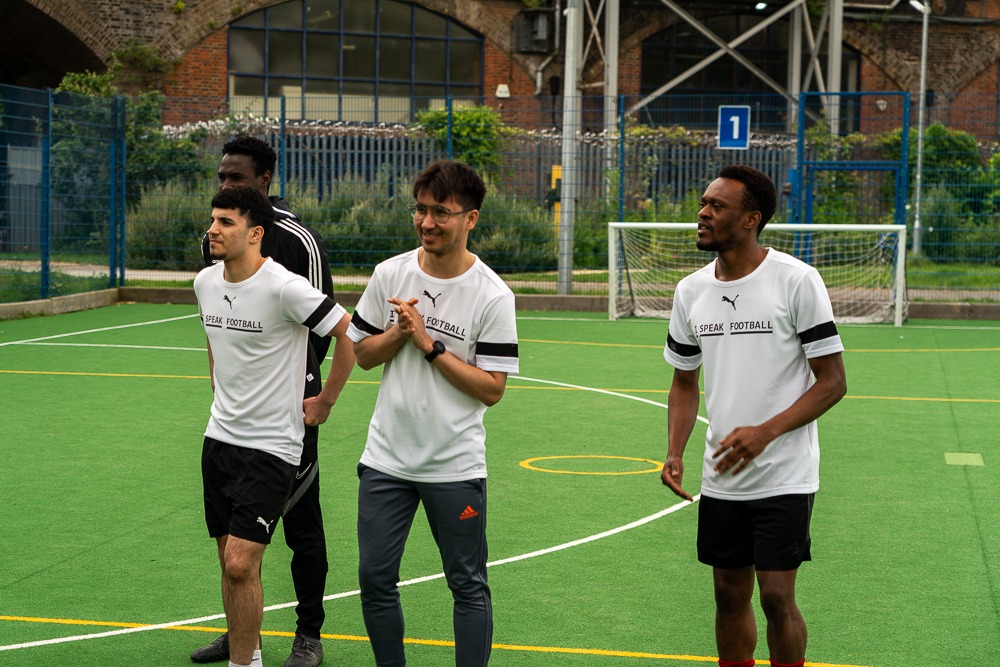 Bonito: How important are partnerships to a program like yours? local communities, mental health experts, language teachers- it feels like you need to have a really wide ranging team?
Bonito: How important are partnerships to a program like yours? local communities, mental health experts, language teachers- it feels like you need to have a really wide ranging team?
Djibril: We think of I Speak Football being a trio of language, football, and refugee/trauma-informed approaches. For each of these corners of the triangle we work with experts, and local representatives. We know that what might work in one area might not be right for others, or for different types of migrants. So we start by mapping partners, and working with refugee organisations to understand what are the barriers for integration in their community. Where possible we always try to work with local councils, mosques, churches, schools, and families to make sure we’re delivering what is really needed. We have to do this with local expert partners, so we do all of this through a trio partnership model in each area. The only core expertise is our board of directors, our technical football, refugee, and ESOL experts, and our amazing Refugee Advisory Board who meet each month to give us feedback and help us improve our programme delivery.
Bonito: we really congratulate you Djibril for this exciting program and cant wait to see it expand in the future- thanks so much for joining us today!
Djibril: Thanks so much for the platform on such an important day!
